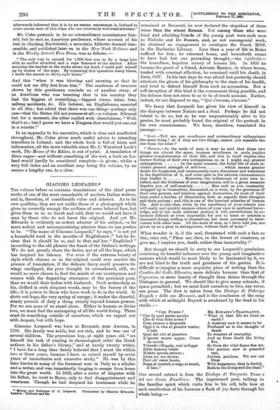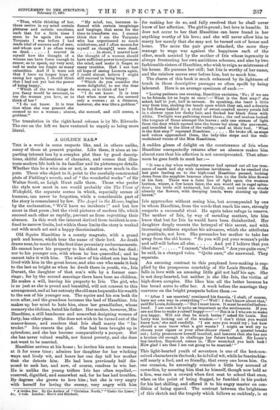GIACOMO LEOPARDI.* THE volume before us contains translations of the
chief prose works of one of the most remarkable of modern Italian writers, and is, therefore, of considerable value and interest. As to its own qualities, they are not unlike those of a photograph which gives us correctly enough the outlines of some beloved face, but gives them to us so harsh and. cold, that we would not have it seen by those who do not know the original. And yet Mr. Edwards is evidently an ardent admirer of his subject,—a far more ardent and uncompromising admirer than we can profess to be. "The name of Giacomo Leopardi," he says," is not yet a household word in the months of Englishmen ;" but he de- sires that it should be so, and to that end has " Englished " (according to the old phrase) the finest of the Italian's writings. We do not greatly share the desire, nor at all the hope, which has inspired his labours. For even if the extreme beauty of style which charms us in the original could ever survive the process of translation, if the delicate fancy could preserve its wings unclipped, the pure thought be unweakened, still, we would no more choose to feed the minds of our countrymen and women with the despairing utterances of the pessimist poet, than we would their bodies with hasheesh. Such melancholy as his, clothed in such eloquent words, may be the luxury of the idle; it is poison to those who have work to do in the world. It shuts out hope, the very spring of energy; it makes the cheerful, steady pursuit of duty a thing utterly beyond human powers. Per we can none of us stand alone. Either in human or divine love, we must find the mainspring of all life worth living. There must be something outside of ourselves, which we regard not with despair, but with hope.
Giacomo Leopardi was born at Recanati, near Ancona, in 1798. His family was noble, but not rich, and he was one of several children. The precocious boy, at eight years old, "set himself the task of reading in chronological order the Greek authors in his father's library," and at barely twenty writes, "I have for a long time firmly believed that I must die within two or three years, because I have so ruined myself by seven years of immoderate and excessive study." He was by this time known to many of the foremost men in Italy as a scholar and e. writer, and was impatiently longing to escape from home into The great world. In 1822, after a series of disputes with his father, he went to Rome, only to find disappointment and weariness. Though he had despised his townsmen while he Essaus and Dialogues of G. Leopardi. Translated by Charles Edwards. London : Trailer and 0o. remained at Recanati, he now declared the stupidest of them wiser than the wisest Roam Yet among those who were kind and admiring friends of the young. poet were such men as Niebuhr and Be Bunsen, and, as not uncongenial work, he obtained an engagement to catalogue the Greek MSS. in the Barbarini Library. Less than a year of life in Rome sufficed for him; he returned home, and henceforth seems to have had but one pervading thought,—the infelicitI- the boundless, hopeless misery of human life. In 1833 he became the guest of a friend, Antonio Ranieri, in whose house, tended with constant affection, he remained until his death, in June, 1837. In his last days he was afraid lest posterity should attribute the gloom of his philosophy to the state of his health, and tried to defend himself from such an accusation. But a self-deception of this kind is the commonest thing possible, and his defence does not seem to us to be of much account. Rather, indeed, we are disposed to say, " Qai s'excuse, s'accuse."
We fancy that Leopardi has given his view of himself in the dialogue between Nature and. a Soul. Perhaps he did not intend to do so, but as he was unquestionably alive to his genius, he most probably found the original of the portrait in his own consciousness. We have, therefore, translated the passage :— "Soui.—Tell me, are excellence and extraordinary unhappiness the same thing ? or if they are two things, cannot you separate the one from the other ?
"Nature.—In the souls of men, it may be said that these two things are almost the same, because excellence in souls implies greater comprehension of their life, and this in itself implies also keener feeling of their own unhappiness, or, as I might say, greater unhappiness In the same manner, the fuller life of souls in- cludes greater strength of self-love which means greater desire for happiness, and consequently more discontent and weariness in the deprivation of it, and more pain in the adverse circumstances
that hinder it Moreover, the refinement of your own in- tellect, and the liveliness of your imagination, will in a great measure
deprive you of self-mastery Men such as you, constantly wrapped up in themselves, dominated, as it were, by the greatness of their own powers, and helpless against themselves, lie most of their time under a burden of irresolution both as regards their thoughts and their actions ; and this is one of the heaviest miseries of human life. Add to this that, while by the excellency of your talents you will easily and quickly surpass others of your race in profound know- ledge, and in the most abstruse studies, it will, nevertheless, be ex- tremely difficult or even impossible for you to learn or practise a thousand things, trifling in themselves, bat most necessary in inter- course with other men. All the souls of men, as I have told you, are given up as a prey to unhappiness, without fault of mine."
What wonder is it, if the soul, threatened with such a fate as this, cries out, "Place me, then, in the lowest of creatures, or give me, I implore you, death, rather than immortality !"
But though we should be sorry to see Leopard's pessimism exercising its baneful influence over the young and imaginative natures which would be most likely to be fascinated by it, we are not blind to the truth and greatness of his genius. It is difficult to imagine a more exquisite piece of writing than the °antic° del Gallo 8ilvestro, more delicate humour than that of
Copernieo, or more beauty of thought than shines through the Dialogues in general. We should like to give many extracts, if space permitted ; but we must limit ourselves to two, one verse, one prose. The first is taken front the Dialogo di Feclerigo Buysch e dells sue Mummie, and is the conclusion of the song with which at midnight Ruysch is awakened by the dead in his studio -:— "ORE Fommo ? MR. EDWARDS'S TRANSLATION.
"Che fu quel panto acerbo "What is that life we lived on
Che di vita ebbe nome ? earth ?
Cosa arcana e stupenda A mystery now it seems to be Oggi 6 la vita al pensier negro, Profound as is the thought of e tale death Qual del vivi al pensiero L'ignota morte appar. Come And as from death the living To wearers of mortality.
flee, da morte So from the vital flame flee we. Vivendo rifoggia, cosi refugge Our portion now is peaceful Della flamma vitale Nostra ignuda nature; rest, Joyless, painless. We are not Lieta no, ma genre..
Per6 ch' eager beato, blest With happiness, that is forbid, Nega ai mortal, e nags ai mm-ti, Both to the living and the dead." Il fate."
Dialog() di Torquato Tasso e
Our second extract is from the
imprisoned poet, talking to del suo Genio Familiare. The him in his cell, tells how at the familiar spirit which visits flash of joy darts through his each recollection of his Leonora a whole being :— that when she was present she
seemed to me a woman ; absent, she seemed, and still seems, a goddess."
The translation in the right-hand column is by Mr. Edwards. The one on the left we have ventured to supply as being more literal. "Thus, while thinking of her, there revive in my mind certain pictures and certain emotions, such that for a little time I seem to be again the same Torquato I was before I had made trial of sorrows and of men, and whom now I so often weep as dead. . . . . I marvel in myself how the thought of a woman can have force enough to renew, so to speak, my very soul, and to make me forget so many calamities. And if it were not that I have no longer hope of seeing her again, I should think that I had not yet lost the power of being happy.
"Which of the two things do you fancy would be sweetest, to see the woman you love, or to think of her ?
"I do not know. It is true "My mind, too, becomes in- flamed with certain imaginings and longings, that seem for the time to transform me. I cannot think that I am the Torquato who has experienced so much misfortune, and I often mourn for myself as though:I were dead. In short, I marvel how the thought of a woman should have sufficient power to rejuvenate the mind, and make it forget so many troubles. Had I not lost all hope of seeing Leonora again, I could almost believe I might still succeed in being happy.
"Which do you consider the more delightful, to see the dear woman, or to think of her ?
"I do not know. It is true that when near me, she seemed only a woman ; at a distance, however, she was like a goddess."















































 Previous page
Previous page